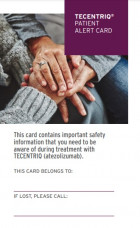Tecentriq
Also called atezolizumab
Key points about Tecentriq
- Tecentriq ('tee-sen-trik') is a medicine that's used to treat certain cancers.
- Find out how it is given and possible side effects.

Tecentriq is a medicine that's used to treat certain cancers by working with your body's immune system to detect and destroy cancer cells (called immunotherapy). Tecentriq belongs to a group of medicines called immune checkpoint inhibitors. Read more about immune checkpoint inhibitors and how they work.
In Aotearoa New Zealand, from 1 April 2023, Tecentriq is funded for the treatment of advanced or metastatic non-small cell lung cancer (NSCLC) for people who meet eligibility criteria.
Tecentriq is given by a drip into your vein (called an intravenous infusion or ‘IV’) every 2, 3 or 4 weeks.
First dose: Your first dose of Tecentriq will be given over 60 minutes.
Following doses: Your healthcare team will monitor you carefully during the first infusion. If you don't have a reaction during the first infusion, the next doses will be given to you over 30 minutes.
The dose of Tecentriq you will be given depends on many factors, including your weight, your general health or other health problems, and the type of cancer being treated. Your doctor will work out your dose and schedule.
During the infusion
Most people have few side effects during the infusion. On rare occasions Tecentriq can cause a reaction while it's being given or within one day of having the infusion. You experience fever, chills, flushing, dizziness, back or neck pain or have trouble breathing.
Tell the nurse immediately if any of these symptoms occur. This reaction is usually mild and can sometimes be controlled by giving Tecentriq more slowly.
Before starting Tecentriq, tell your doctor about any other medicines you are taking including prescription, over-the-counter, vitamins, or herbal remedies.
Tell your doctor if you're pregnant, or may be pregnant, before starting Tecentriq. Tecentriq is not recommended for use during pregnancy. You should avoid becoming pregnant while you are on Tecentriq. Use effective birth control during treatment and for at least 5 months after your final dose of Tecentriq. Ask your doctor when you may safely become pregnant after therapy.
Tell your doctor if you're breastfeeding or plan to breastfeed. It is advised not to breastfeed during treatment with Tecentriq and for 5 months after your final dose.
Here are some things to know when you're taking Tecentriq. Other things may be important as well, so ask your healthcare provider what you should know about.
Vaccinations
- Since Tecentriq affects your immune system, you are at increased risk of infection. It's strongly advised that you're up-to-date with the annual flu vaccination and the Covid-19 vaccinations. These are non-live vaccines and are safe to have while you're receiving immune checkpoint inhibitor treatment.
- Live vaccines such as MMR (measles, mumps and rubella) and varicella (chickenpox vaccine) should NOT be given while you are receiving immune checkpoint inhibitor treatment and for 6 months after treatment has stopped.
Treatment delays
There may be times when your treatment is delayed. This can happen:
- if your doctor thinks you may have severe side effects
- if you get severe side effects
- if your blood counts are affected
- if you're finding it hard to cope with the treatment.
Your doctor will tell you if you need any delays to your treatment and the reason why.
Like all medicines, Tecentriq can cause side effects, although not everyone gets them. Because Tecentriq affects the immune system, it may cause immune cells to attack healthy cells, triggering a variety of side effects.
You may experience side effects at any time during your treatment or even months after treatment has finished. Some side effects go away within a few days or weeks and some may be longer lasting.
Note: To monitor your side effects, you will need regular reviews and blood tests to check your thyroid, liver, kidneys and blood before you start treatment and regularly while you are receiving treatment.
| Common side effects |
|
Report any side effect to your healthcare provider straight away even if they appear mild. Do not manage these side effects on your own:
|
Rare, serious side effects |
|
For some people, these side effects could be life threatening. If you have any of the side effects mentioned below OR any new or worsening symptoms, contact your healthcare team or Healthline on 0800 611 116 straight away:
Note: This is not a full list of side effects and side effects can vary in different people. If you are unsure whether your symptoms are side effects, contact your healthcare team straight away. |
Here are links to resources to track your symptoms and side effects.
Te Kete Haerenga and fatigue
Te Kete Haerenga and sleep
Te Kete Haerenga and pain
Te Kete Haerenga – tools and diaries
Symptom tracker(external link)
Tecentriq(external link) Medsafe Consumer Information Sheet
Tecentriq(external link) Roche Lung Cancer Treatments
References
- Atezolizumab(external link) New Zealand Formulary
- Immune checkpoint inhibitors: primary care considerations(external link) He Ako Hiringa
- Autoimmune complications of immunotherapy(external link) Medsafe, NZ
- Pharmac funds two new treatments for lung cancer(external link) Pharmac, NZ
Brochures

Tecentriq patient card
Roche, 2023

Medicines and side effects
Healthify He Puna Waiora, NZ, 2024
Credits: Healthify He Puna Waiora editorial team. Healthify is brought to you by Health Navigator Charitable Trust.
Reviewed by: Healthify clinical advisors
Last reviewed:
Page last updated:






